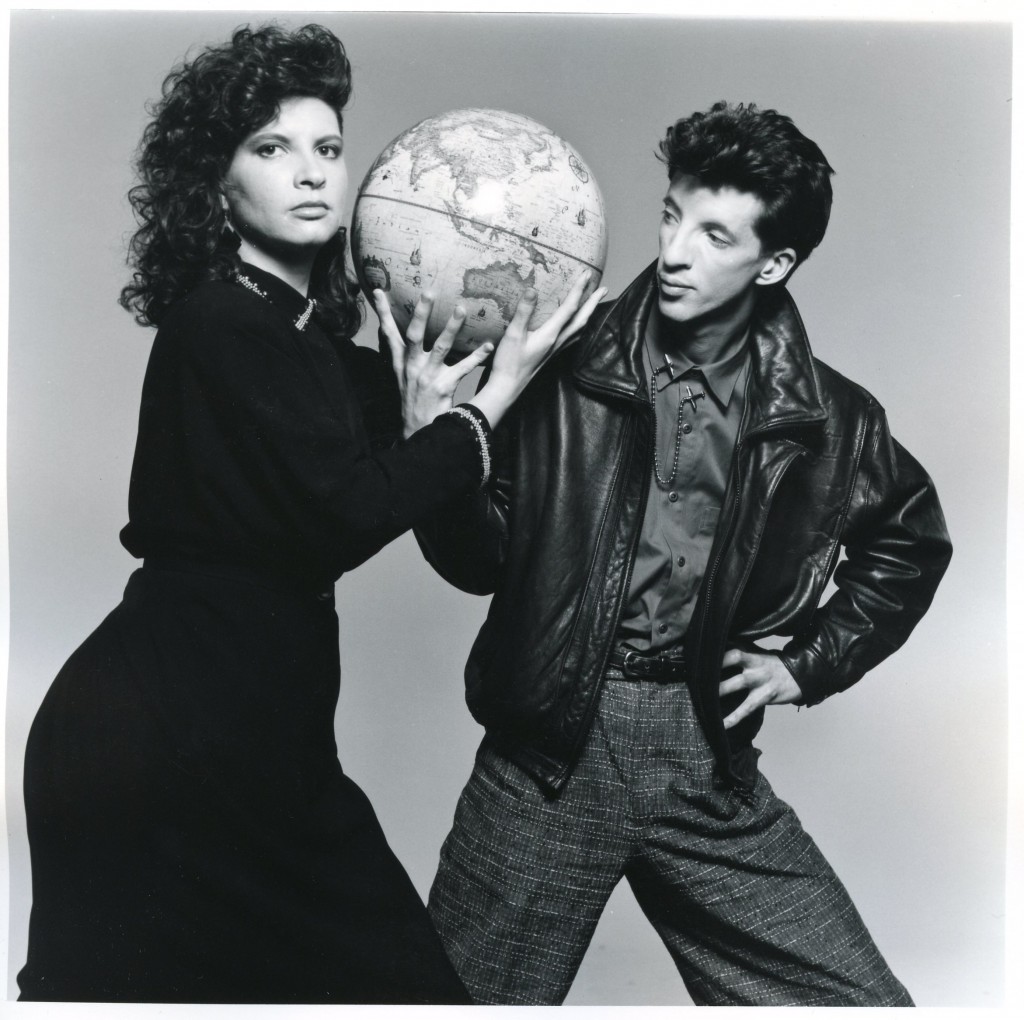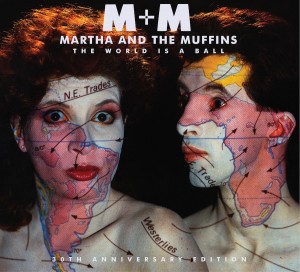Martha and the Muffins – The World Is A Ball
As 80s music transcends the level of nostalgia to undergird so much of today’s pop, electronic, dance, and indie rock music, an intriguing album reissue arrives saturated with the sounds and stylistic shifts of 30 years ago. The World Is A Ball, originally released in 1986, is arguably the “lost” album by Martha and the Muffins, Canada’s greatest new wave band.
Best known for the enigmatic “Echo Beach,” a 1980 single that cracked the UK Top 10, Martha and the Muffins navigated the first half of the decade with aplomb, particularly on three albums recorded by Daniel Lanois, then an obscure Canadian producer. By 1984 the band had shrunk from six to two, Martha Johnson and Mark Gane, renamed themselves M+M, and reached #2 on the U.S. dance charts with “Black Stations/White Stations,” held off from #1 only by Prince’s “When Doves Cry.” Following that success, The World Is A Ball would be the duo’s most expensive album to record, yet remarkably their distributor RCA Records declined to release it in the then-novel CD format. Outside of Canada, where the absurdly catchy “Song In My Head” charted, the record failed to gain traction and soon went out of print.
So The World Is A Ball is a lost album in this commercial sense, though it was surely further lost to the studio overproduction that by now is synonymous with the expression “80s music.” Johnson and Gane recorded in Bath, England, with David Lord, whose previous credits included Peter Gabriel’s Security and XTC’s Big Express. With his classical music training and knack for writing sophisticated arrangements on the fly, Lord moved the band away from the untrained experimentalism of the Lanois records. The new producer coaxed bravura performances out of Johnson’s subdued vocals and upped the ante on Gane’s art-rock instincts, for instance separately treating and recording all six strings on assorted rhythm guitar tracks.
If Lord’s technique sapped some of the spontaneity found in prior Muffins albums, the duo’s turn toward glossy dance-pop directed them toward a more processed sound anyway. “Only You” and the title track build resonant, stadium-scale anthems out of thumb-popping funk; trance-inducing Afro-rhythms on “I Watch I Wait” and “By The Waters Of Babylon” draw from the well tapped by Peter Gabriel at this time (coincidentally under Daniel Lanois’s guidance just down the road); and “Song In My Head” and “As A Matter Of Fact” offer brassy radio fodder akin to Level 42 and T’Pau. Now there’s 80s baroque, and then there’s 80s excess, exemplified by Lord’s original mix that Gane later described as you cannot have enough top end. This is where the 30th anniversary remaster is crucial, recovering the missing bottom and restoring balance to the mix.
Let today’s “poptimists” decide which of The World Is A Ball’s styles sound the most relevant or inspiring in 2017; ultimately, it’s fresh 21st-century ears that will restore the album’s legacy from its extant reputation as out of fashion. From the beginning, Martha and the Muffins displayed an aloofness that kept their cerebral, hypnotic approach free of the hustle and parochialism of Toronto’s downtown music scene. With The World Is A Ball, their instincts led them out of the underground once and for all. That said, almost all of new wave’s first generation fell from favor at this time. In 1986, college radio had responded to MTV’s ascendancy by diving deeper into the indie underground (Husker Du, Janes Addiction, the Pixies, Ministry et al), while adventurous Canadian listeners looked to roots rock (the Cowboy Junkies, Tragically Hip), alt-country (k.d. Lang, Blue Rodeo), and a new cohort of arty frontwomen (Jane Siberry, Mary Margaret O’Hara). Only with the distance of thirty years can this album finally be heard on its own idiosyncratic, ambitious terms.
The World Is A Ball isn’t the best album by Martha and the Muffins, since the band’s catalogue includes at least four superior and shockingly overlooked records by my count. But it’s never less than musically intelligent, fearlessly exploratory of new sounds and ideas, and fully committed to the dreamlike imagery and subliminal emotion traced across the band’s career. And in its embrace of the dance-pop styles and production values of the mid-1980s, The World Is A Ball is rich in musical signifiers that, maybe more than for any other Muffins album, are amenable to recontextualization and reappropriation for our time.
The World Is A Ball (30th Anniversary Edition) is out now on CDBaby and iTunes.






